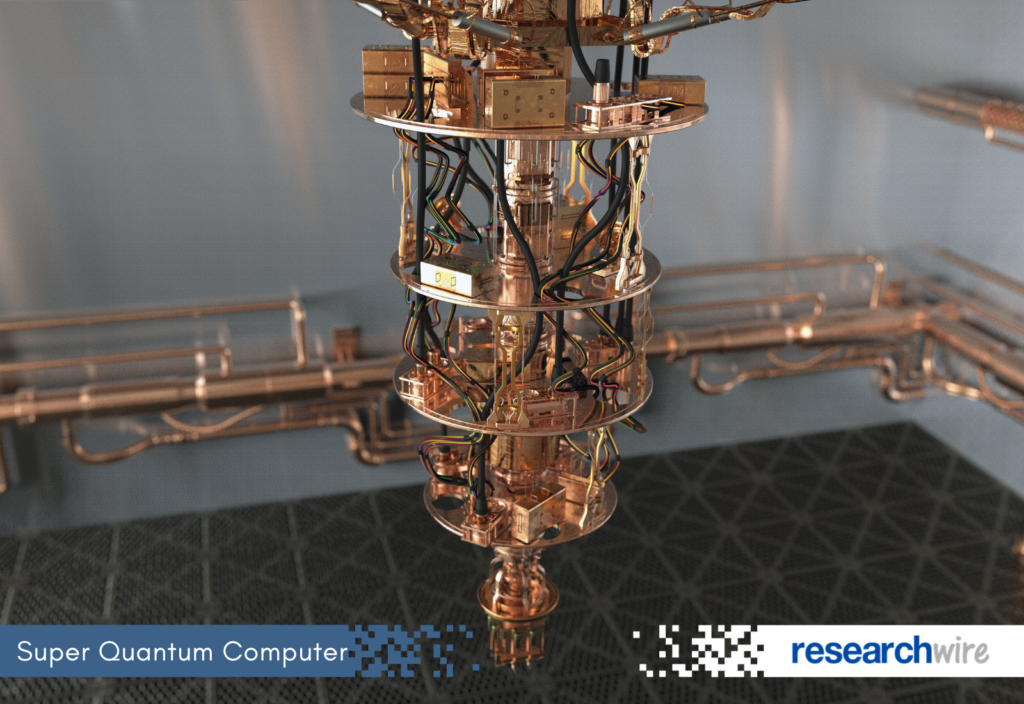Rohit Kumar is responsible for Researchwire European & North American business. He is an HEC, Paris 2008 MBA and Indian Institute of Technology (IIT) Kharagpur 2002 engineering graduate with close to 17 years of experience in business innovation and strategy, business development and client relationship roles. He is working with ResearchWire since 2016 and as a partner, is responsible for the growth of ResearchWire in Europe and North America.
Prior to ResearchWire, Rohit was handling sales strategy and pricing for Syniverse Technologies, a telecom services provider, where he was instrumental for growth in EMEA and India through product innovations, creative pricing and discounting models and executing strategic sales plans.
Rohit is based out of Luxembourg and has been living in Europe for last 12 years. He understands European & North American customers and their needs and ensures that our customers always have a local person to reach out whenever needed.
Introduction to Post-Quantum Encryption (PQE)
In the contemporary digital landscape, characterized by the prominence of data as an asset, the imperative for fortified security measures stands paramount. The continuous evolution of cyber threats underscores the susceptibility of existing encryption standards. Herein emerges Post-Quantum Encryption (PQE) as an advanced and intricate defence mechanism designed to counter the imminent risk presented by the ascent of quantum computing.
Understanding the Need for Advanced Encryption
Every day an immense volume of sensitive data navigates through the realms of cyberspace. Financial transactions, personal details, and confidential documents all hang in precarious balance without a robust defence infrastructure. Advanced encryption stands as the bulwark safeguarding this information from potential compromise. Its role transcends mere data protection. Rather, it orchestrates a system where authorized access is meticulously controlled, ensuring that only the designated individuals are granted privilege of entry.
The Emergence of Quantum Computing and its Threat to Current Encryption Standards
Quantum computing, a disruptive leap in technology, promises an extraordinary surge in computational power. Yet, this potential is not solely advantageous; it presents an unprecedented peril to traditional encryption methodologies. The algorithms that presently safeguard our data might succumb like fragile sandcastles in the face of the computational prowess wielded by quantum computers, ultimately rendering them ineffectual.
As businesses and governments increasingly rely on digital frameworks, the criticality of bolstering our encryption standards has ascended to a paramount position. The pursuit of secure and resilient encryption has thus catalysed the emergence of Post-Quantum Encryption (PQE) – a beacon of optimism amidst this quantum upheaval. Embracing PQE signifies our commitment not only to shielding data but also to futureproofing it against the imminent threat posed by quantum supremacy.
Fundamentals of Post-Quantum Cryptography
In the vast realm of cybersecurity, cryptography stands as a stalwart, safeguarding sensitive information and intrusive eyes. Understanding its foundations is pivotal, especially when confronted with the impending supremacy of quantum computing.
-
Exploring the Basics of Cryptography
At its core, cryptography is the art of practising secure communication in the presence of adversaries. It involves creating mathematical algorithms for encryption and decryption, ensuring that information remains confidential and tamper-proof. Traditional cryptographic methods, such as RSA and ECC (Elliptic Curve Cryptography), have long been the bedrock of digital security.
-
Challenges Posed by Quantum Computers to Traditional Encryption
Quantum computers possess an inherent advantage over classical computers due to their ability to process immense amounts of data at speeds that surpass existing systems. This prowess poses a profound threat to traditional encryption algorithms. Specifically, these quantum machines can crack the mathematical problems underpinning prevalent encryption methods, potentially compromising the security of sensitive data.
-
What is Post-Quantum Cryptography and How Does it Work?
Post-Quantum Cryptography (PQC) is the vanguard of cryptographic innovation designed explicitly to withstand the brute force of quantum computers. PQC algorithms rely on mathematical constructs that remain resilient even in the face of quantum computational power. These algorithms, rooted in diverse mathematical disciplines such as lattice-based, code-based, multivariate, hash-based, and isogeny-based cryptography, offer promising alternatives to the vulnerable classical encryption methods.
Post-Quantum Cryptography charts a new course, ensuring data confidentiality and integrity in an era threatened by the looming quantum revolution.
Types of Post-Quantum Encryption Algorithms
In the rapidly evolving landscape of cybersecurity, Post-Quantum Encryption (PQE) introduces an array of sophisticated cryptographic algorithms, each designed to withstand the computational prowess of quantum computers. Let’s explore the distinct categories of Post-Quantum Encryption:
-
Lattice-Based Cryptography
Lattice-based cryptography operates on the complexity of mathematical lattices, leveraging their intricate geometric structures to form a basis for cryptographic functions. This approach capitalizes on the computational complexity of certain lattice problems to construct secure encryption schemes.
-
Code-Based Cryptography
Code-based cryptography relies on error-correcting codes, employing mathematical techniques to protect information. It banks on the complexity of decoding linear error-correcting codes, which withstand quantum attacks due to their difficulty in factoring large numbers.
-
Multivariate Cryptography
Multivariate cryptography rests on the complexity of solving systems of multivariate polynomial equations. It transforms these equations into cryptographic schemes, making decryption computationally challenging, even for quantum computers.
-
Hash-Based Cryptography
Hash-based cryptography centres on hash functions, relying on their one-way nature to ensure data integrity and authentication. These cryptographic protocols remain secure against quantum adversaries, primarily due to their resistance to reverse engineering.
-
Isogeny-Based Cryptography
Isogeny-based cryptography capitalizes on the intricacies of mathematical quandaries associated with elliptic curves and their isogenies. By harnessing these structures, it devises encryption methodologies that withstand quantum attacks, thereby ensuring the establishment of secure communication channels.
Understanding these diverse Post-Quantum Encryption algorithms becomes crucial in fortifying our data against the potential threat posed by quantum computing.
Advantages and Challenges of PQE
As the digital landscape evolves, Post-Quantum Encryption (PQE) emerges as a robust fortress against the threats posed by quantum computing. Understanding its advantages and challenges is vital in navigating the complexities of securing data in the quantum era.
-
Security Strengths of Post-Quantum Encryption
PQE brings a breath of resilience to the table. Its core strength lies in its ability to withstand the immense computational power of quantum computers. Unlike traditional encryption methods susceptible to quantum attacks, PQE algorithms employ mathematical complexities that remain resistant, ensuring data confidentiality and integrity.
Implementation Challenges and Performance Considerations
While the security prowess of PQE is indisputable, its implementation poses notable challenges. Transitioning from conventional encryption methods to PQE demands careful consideration and substantial computational resources. Furthermore, performance overheads due to increased computation requirements remain a concern that necessitates meticulous optimization strategies.
-
Compatibility and Transition Strategies
Adopting PQE requires a seamless transition without disrupting existing systems. Ensuring compatibility between legacy systems and PQE protocols becomes imperative. Forward-thinking organizations strategize meticulously, gradually integrating PQE while ensuring interoperability and backward compatibility.
Navigating the implementation hurdles and optimizing performance remain key challenges. However, with strategic planning and a gradual transition, the benefits of PQE can outweigh these challenges, offering a quantum-secure future for sensitive data.
Patent Filing Trends in PQE and Companies Filing Them
Within the cybersecurity domain, the race to secure digital fortresses against quantum threats has led to a surge in patent filings for Post-Quantum Encryption (PQE) technologies. Understanding these trends and the key players behind them sheds light on the evolving landscape of quantum-resistant security measures.
Overview of Patent Filing Trends in Post-Quantum Encryption
The patent landscape in PQE depicts a growing interest among tech giants, startups, and research institutions. Recent years have witnessed an exponential rise in patent filings related to PQE, signalling a collective recognition of the imminent need for quantum-resistant encryption.
Major Companies Investing in Post-Quantum Encryption Patents
Synergy Quantum has established itself as an industry trailblazer through its proactive approach in patent filings related to Post Quantum Encryption (PQE). Notably, the company achieved a groundbreaking milestone in 2021 by developing and patenting the world’s first Post-Quantum Encrypted closed communication network, underscoring its commitment to pioneering secure quantum technologies. Synergy Quantum’s focus on PQE extends beyond mere innovation, with an emphasis on practical applications across diverse sectors, including banking, Government National Identity Programs, secure microchips, and other transformative realms. These patents represent the company’s dedication to pushing the boundaries of PQE security, positioning it as a leader in fortifying data protection and communication through quantum-driven solutions.
Global tech titans such as IBM, Microsoft, Google, and Intel are actively investing in developing and patenting PQE solutions. As per data obtained from GlobalData’s patent analytics database, technology-based organizations in the United States are at the forefront in the number of patents related to quantum computing. The top three companies contributing the most to patent filings are IBM (with a total of 1,885 publications), Alphabet (with 1,000 filings), and Northrop Grumman (with 623 patents). Their strategic endeavours reflect the significance of quantum-safe encryption in shaping the future of cybersecurity.
Real-World Applications and Adoption
Post-Quantum Encryption (PQE) is not merely a theoretical concept; its tangible impact spans across various industries, fostering a quantum-safe environment for sensitive data. Let’s understand its practical applications and increasing adoption.
Industries Benefiting from PQE and Road Ahead
Numerous sectors are embracing PQE to fortify their data security measures. From finance and healthcare to government institutions and cloud service providers, PQE ensures robust protection against future quantum threats. Its adoption extends to securing communication networks, IoT devices, and blockchain transactions.
The trajectory of PQE adoption signals a promising future. As quantum computing advances, the necessity for robust encryption becomes paramount. The integration of PQE into global cybersecurity standards and protocols ensures a secure data ecosystem resilient to quantum vulnerabilities.
Conclusion
Post-Quantum Encryption (PQE) serves as a crucial defense against the looming threat of quantum computing on current encryption standards. Its implementation goes beyond choice, being vital for protecting sensitive data across industries. PQE’s urgency stems from its capability to thwart potential breaches amid quantum attacks, ensuring data security.
Looking forward, the future of encryption hinges on PQE’s advancement and widespread adoption. As quantum computing advances, the strength of our encryption systems will determine global data network security. PQE emerges as a beacon of hope, safeguarding sensitive information from quantum adversaries. Embracing PQE isn’t just an option; it’s a strategic necessity. Its evolution and integration into digital infrastructure will define data security resilience in the quantum era.
Navigating the intricate landscape of PQE requires specialized expertise, and enterprises such as Researchwire provide insights and services that empower innovators to shape the future responsibly. If you are a stakeholder in the innovation ecosystem and are looking to get insights into trends in specific technology areas to better position yourself in making proper business decisions, or are developing, or planning to develop, a strong patent portfolio around specific technologies and its use cases, reach out to Researchwire.
About Us
Researchwire is an ISO 27001 certified, specialised IP research and R&D support company. Works closely with IP & legal teams to provide patent portfolio services and all types of patent searches & patent drafting. It provides enterprises and R&D centres with insightful and effective solutions to address their technology development challenges and roadmap planning.




